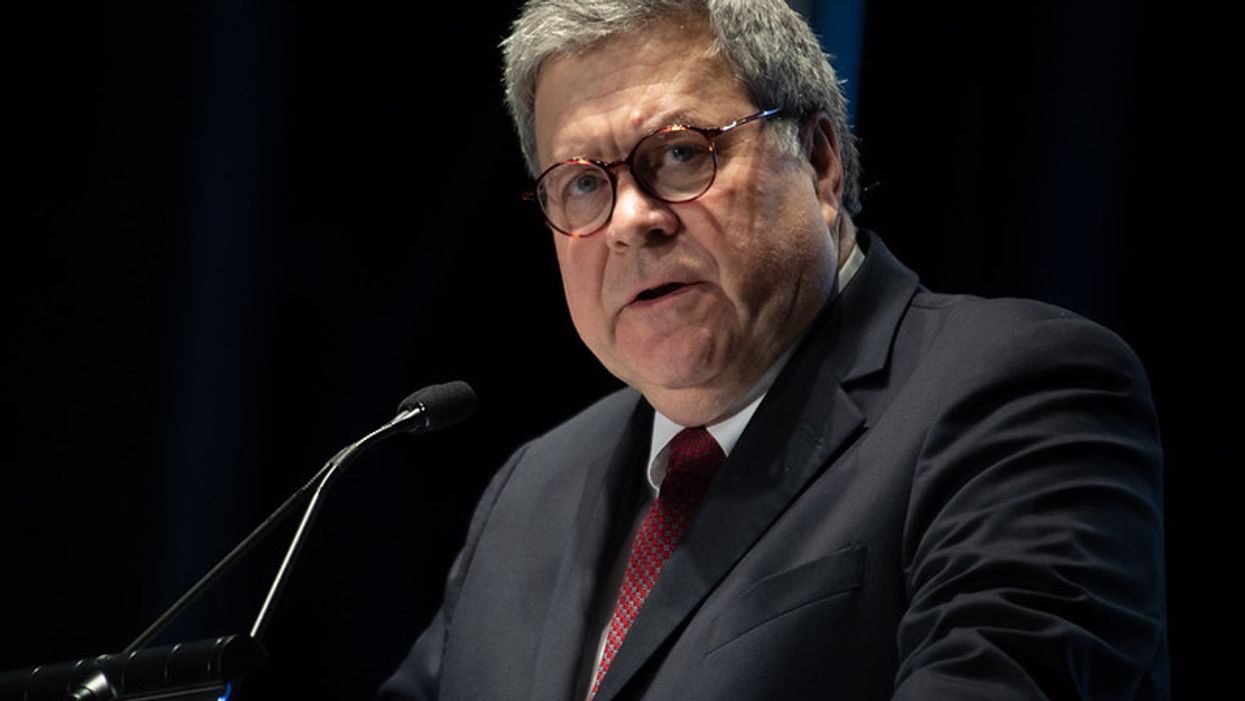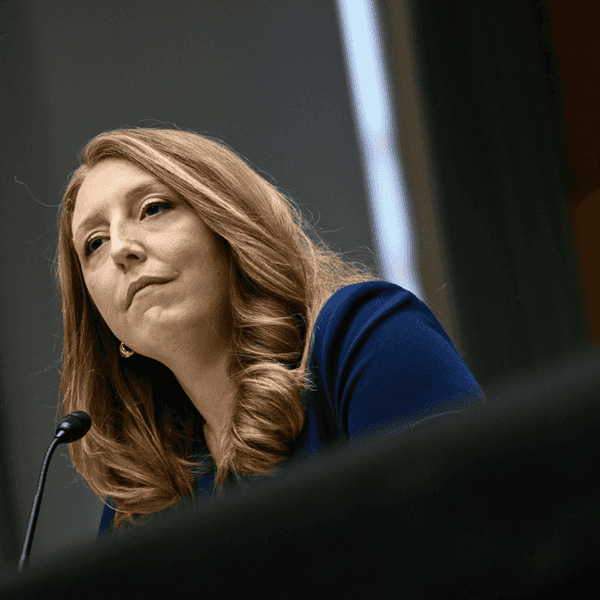Black Lives Matter Lawsuit Holds Barr Personally Liable In Civil Rights Violations

Attorney General William Barr
This article was produced by the Independent Media Institute.
No attorney general since John Mitchell has gotten away with assaulting the rule of law more than Bill Barr. But unlike Mitchell, who served 19 months in prison for his role in the Watergate scandal, Barr has yet to be held accountable for his ever-expanding laundry list of outrageous misdeeds and derelictions.
To be sure, there have been several efforts to bring Barr to heel. Last July, for example, the House voted to hold both Barr and Commerce Secretary Wilbur Ross in criminal contempt for refusing to turn over documents related to the Trump administration's attempt to include a citizenship question in the 2020 census. But in an act of defiance that surprised absolutely no one, the DOJ, which Barr heads, refused to pursue charges against either cabinet member, leaving the House with no means of enforcement.
More recently, more than 2,000 former Justice Department lawyers signed open letters demanding Barr's resignation after he intervened in the cases of Roger Stone and Michael Flynn to overturn the sentencing recommendations of career prosecutors. And in a scathing rebuke published May 9, the editorial board of the New York Times accused Barr of using the DOJ as a "political weapon" to advance and protect the personal interests of the president. And yet despite the denunciations, Barr remains, in effect, the country's top cop.
But where Congress and Barr's critics have come up empty, the Black Lives Matter (BLM) movement may ultimately succeed. On June 4, BLM's Washington, D.C., chapter and five individuals filed a novel and potentially far-reaching federal lawsuit against Barr, President Trump, Secretary of Defense Mark Esper, Army Chief of Staff General James McConville and other law enforcement officials, alleging their First and Fourth Amendment rights were violated when peaceful demonstrators were violently removed from Lafayette Square, just outside the gates of the White House, on the evening of June 1.
The individual plaintiffs, who include a nine-year-old boy, were among thousands of demonstrators who had gathered to protest the murder of George Floyd. The lawsuit (as it was later amended) alleges that "without provocation," and well before a 7 p.m. curfew was scheduled to take effect, "agents in the U.S. Secret Service, U.S. Park Police, D.C. National Guard, Federal Bureau of Prisons, and U.S. Military Police" fired "tear gas, pepper spray capsules, rubber bullets, and flash bombs into the crowd to shatter the peaceful gathering, forcing demonstrators to flee the area. Many peaceful demonstrators were injured, some severely."
The reason the square was cleared, the lawsuit charges, was "to permit the president to walk to a photo opportunity" at St. John's Episcopal Church, accompanied by Barr, Esper, Chief of Staff Mark Meadows, Ivanka Trump, and other senior advisers. Outside the church, Trump paused briefly for pictures, clumsily raising a Bible in his right hand. He returned to the White House at approximately 7:09 p.m. without entering the church or uttering a word of prayer, conciliation or condolence.
The photo stunt, according to the suit, "was a wholly illegal reason for abridging the constitutional rights of Plaintiffs and the others assembled in Lafayette Square."
Of all the defendants sued in the case, Barr is the only one cited in both his "individual" and "official" capacities. All the others, including Trump, are being sued only in their official roles as government actors. The distinction, while technical, is important because only officials sued in their individual capacities can be held personally liable for damages caused by their actions.
I spoke by phone with two of the attorneys handling the lawsuit—Kaitlin Banner of the Washington Lawyers' Committee for Civil Rights and Urban Affairs, and Scott Michelman, the legal director of the American Civil Liberties Union of the District of Columbia—to discuss the legal theories behind the case and to clarify the focus on Barr.
Banner and Michelman confirmed that the typical federal lawsuit alleging police abuse and constitutional violations is litigated against local or state law enforcement under a statutory scheme that dates back to the Ku Klux Klan Act of 1871, and which today is codified as a pillar of civil rights law in section 1983 of title 42 of the United States Code.
There is no federal statute, however, that allows damages actions against federal law enforcement personnel for the violation of constitutional rights. Such suits are nonetheless permitted under a line of cases decided by the Supreme Court, commencing in 1971 with the landmark ruling in Bivens v. Six Unknown Named Agents of Federal Bureau of Narcotics, which authorized civil damages actions for illegal searches and seizures, including unlawful arrests, as well as the use of excessive force.
To establish liability under Bivens against supervisory officials like Barr, Banner and Michelman told me, direct involvement must be pleaded and proven. Barr has been singled out among the defendants in the Black Lives Matter complaint because he gave the order to clear Lafayette Square, setting the stage for the police riot that ensued. Detailing Barr's actions, the complaint, as later amended, alleges that early in the day on June 1, the attorney general "directed the Federal Bureau of Prisons and other federal law enforcement agencies to send 'riot teams' and other specialized agents to control the protests."
And the complaint continues in minute-by-minute detail: "At approximately 6:08 pm, Defendant Barr entered Lafayette Square. At 6:10 pm, Defendant Barr was behind the law enforcement officials in Lafayette Square pointing north towards St. John's Church." By 6:30 p.m., the melee had begun.
Citing reporting in the Washington Post, the complaint alleges that sources within the Department of Justice have acknowledged that Barr personally ordered that Lafayette Square be cleared. And while not mentioned in the complaint, White House Press Secretary Kayleigh McEnany unwittingly confirmed in her June 3 press briefing that Barr had indeed ordered a one-block perimeter in front of the White House to be emptied. Barr has since denied issuing the "tactical order" to start the operation in interviews with the Associated Press and on CBS's Face the Nation. He also asserted, without offering any evidence, that the protesters were "rowdy" and "non-compliant" and had hurled "projectiles" at the police.
In addition to suing Barr under Bivens, the plaintiffs are trying to hold him liable for money damages under two less commonly used provisions of federal law, which outlaw conspiracies to interfere with civil rights. They are also requesting injunctions against all the defendants, including the president, to prevent future military-style attacks on peaceful protesters.
But will the plaintiffs prevail? As they move forward, Banner and Michelman will have to navigate around some daunting legal obstacles, particularly as to Trump. For starters, they won't be able to collect money damages from Trump under Bivens because of the "absolute immunity" presidents are given in damages lawsuits related to their official conduct. And while injunctions can be issued against a president, numerous federal courts have cautioned against them.
It won't be easy to win a Bivens case against Barr, either. The Supreme Court has never approved of Bivens suits based on First Amendment violations, such as those alleged by the BLMDC plaintiffs, although some federal appellate courts have endorsed First Amendment claims. Even more troubling, the Supreme Court is now firmly in the hands of conservative Republican-appointed justices, who have soured on Bivens remedies in general, calling them in an opinion issued earlier this year, "a disfavored judicial activity."
Barr isn't entitled to claim absolute immunity, but he will be able to invoke the defense of "qualified immunity," which shields government officials performing discretionary functions from liability unless their conduct violated "clearly established" statutory or constitutional rights. On June 15, the Supreme Court declined to review a set of appeals that had challenged the continuing validity of the defense.
Despite the hurdles they face, the plaintiffs have no plans to back down. "There isn't a judge in this country," Michelman told me, "who would find that any reasonable official would believe it's constitutional to order an attack on demonstrators who are following the law."
As a measure of their resolve, the plaintiffs amended their complaint on June 9, seeking to certify it as a class action on behalf of everyone assaulted in Lafayette Square. It's always difficult to predict the final outcome of high-profile cases, but this one could be a game-changer, not only for the cause of racial justice, but for our reckless attorney general as well.
Bill Blum is a retired judge and a lawyer in Los Angeles. He is a lecturer at the University of Southern California Annenberg School for Communication. He writes regularly on law and politics and is the author of three widely acclaimed legal thrillers: Prejudicial Error, The Last Appeal, and The Face of Justice.
- GOP Lawmakers Smear Protesters As ‘Organized Crime,’ Demand FBI Action - National Memo ›
- Police Immunity Laws Test Conservative Principle — And Rule Of Law ›








